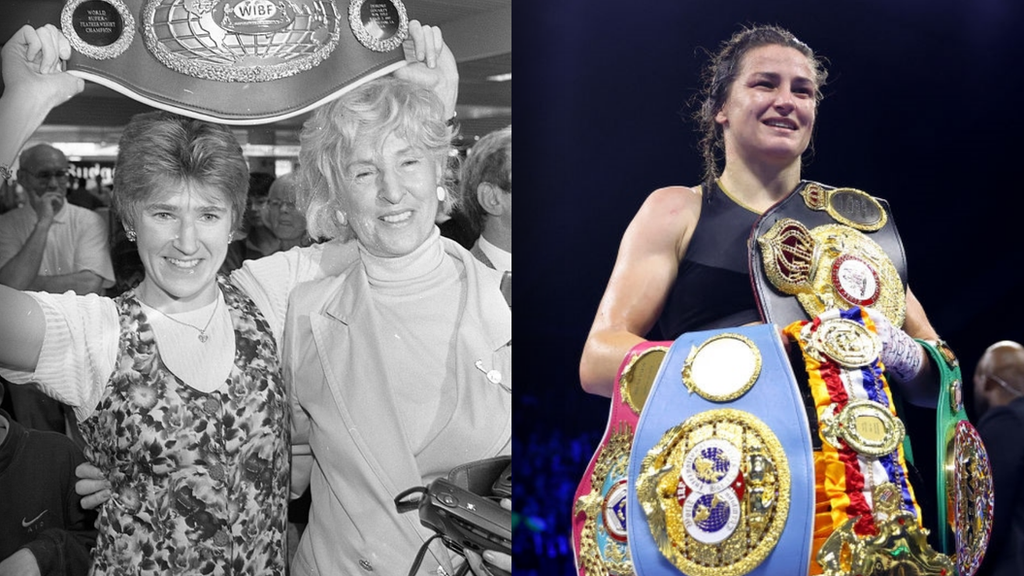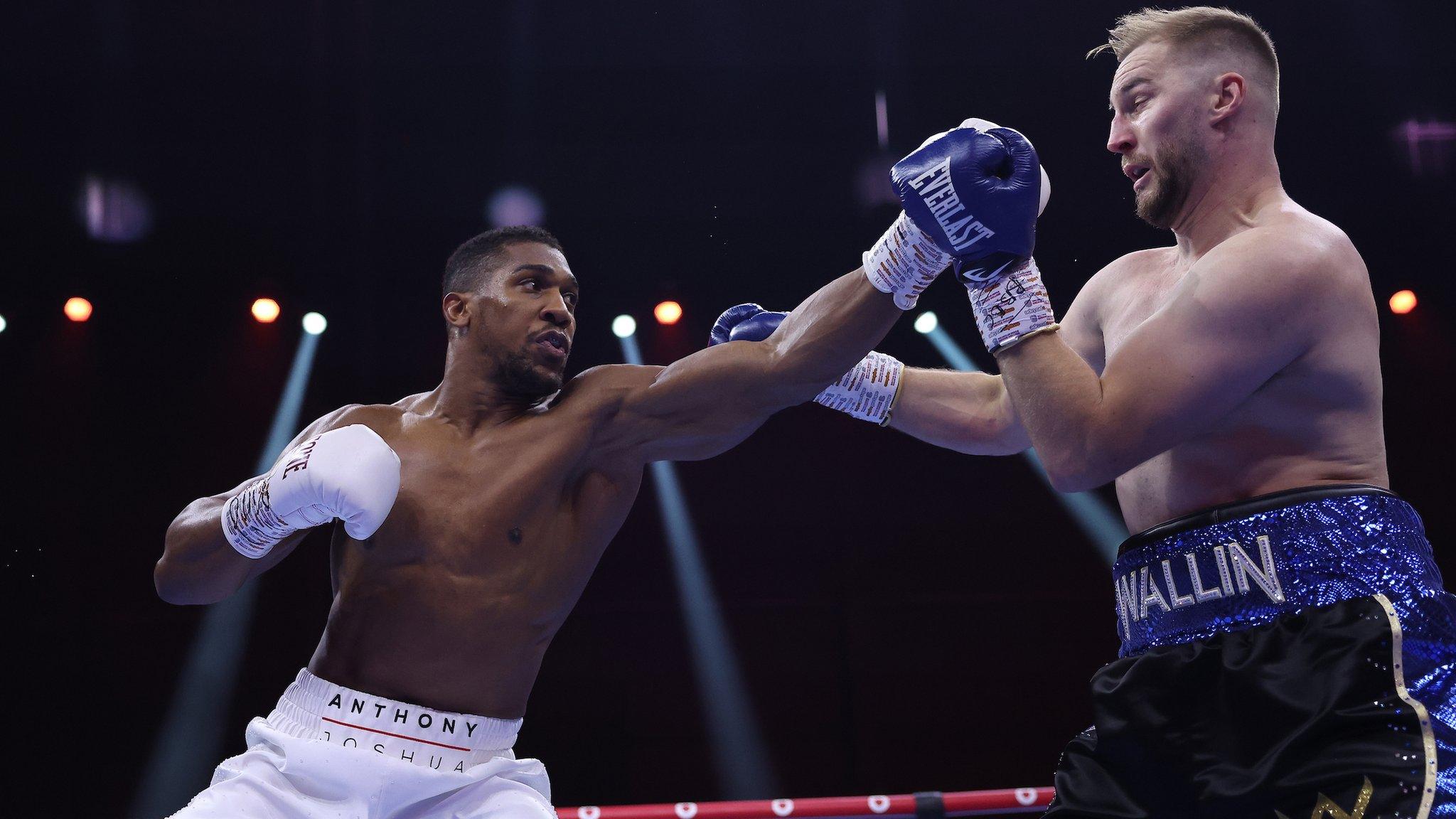Deirdre Gogarty: Meet the world champion who came before Katie Taylor
- Published

Deirdre Gogarty won the Women's International Boxing Federation world featherweight title in 1997 in the United States
Katie Taylor v Chantelle Cameron | |
|---|---|
Venue: 3Arena, Dublin Date: Saturday, 20 May | |
Coverage: Radio commentary on BBC Radio 5 Live, live text commentary and reaction on BBC Sport website & app from 21:00 BST. | |
"Once you're a world champion no-one can take that away from you."
In January 1997, Deirdre Gogarty became the first Irishwoman to win a boxing world title. She was promised $12,500 for the fight in the United States, but never saw a penny.
Back home, it was not front-page news. Four months after the fight, the Irish Times ran the headline 'Gogarty back to evangelise Ireland' when she was met by friends, family and a handful of journalists at the airport with her belt.
But the same paper also ran articles opposing women's boxing.
"You get in the ring and give everything you have, and there's still people against you, who want to bring you down and not allow you to do what you love," Gogarty says.
Women's boxing was illegal in Ireland. Gogarty contested her first pro fight on Irish soil in 1991, but would never be permitted to do so again.
But there was one person who took notice of her - a 10-year-old Katie Taylor.
Taylor would become a decorated amateur, winning Olympic gold. As a professional, she has won world titles in multiple weights and is the current undisputed lightweight champion.
But when she was a pre-teen, none of these options were open to her. Boxing was not even in the Olympics.
Despite this, Taylor still wanted to be a boxer. She wrote a letter to Gogarty and would meet her at her mother's house, asking: "How did you do it when everyone tried to stop you?"
"If you keep working at it and keep showing your skills, somebody's going to say 'we've got to let this girl box'," Gogarty says she told Taylor.
"When I got the letter from her I could see the frustration and I could totally identify with it.
"It's mind blowing. Especially when she writes 'maybe one day they'll let us box in the Olympics'."
This Saturday, in Dublin, Taylor fights in Ireland for the first time as a professional. This is the story of the world champion who came before her.
'No man will ever want to marry you if you're out boxing'
Gogarty was 17 when she committed herself to boxing. She moved to Dublin from Meath to link up with coach Pat McCormack, and had been hiding an obsession for boxing from a young age.
Her mother was against the idea and tried to get her interested in golf instead.
Ireland was traditionally conservative in their expectations of women, but Gogarty wanted something different.
"I was raised to be very ladylike and considerate of others, and respectable. My mother definitely would have liked me to go into more a feminine field," she says.
"It was too rough. I really was very secretive about my love of boxing, because it was very taboo and kind of unacceptable. So I tried to suppress it as much as I could for as long as I could."
"No man will ever want to marry you if you're out boxing," was something Gogarty heard a lot as she spent four years trying to secure a fight on home soil.
The Irish boxing authorities set her on a wild goose chase of passing a medical and when she found a doctor who signed her off to box, they suggested she become a judge or a referee.
But on 30 June 1991, after a four-year search for an opponent, a 21-year-old Gogarty had her first pro boxing fight in Limerick against Anne-Marie Griffin.
Gogarty travelled with McCormack to the fight, telling no-one, not even her family.
"I kept my friends and family life very, very separate to my boxing world," she says.
Fight Camp: How Katie Taylor prepares for her fights
"I didn't want any fusing of the two because I thought my little boxing world would come crumbling down."
The fight was meant to be an exhibition, but Gogarty was declared the winner and the bout remains on her pro record.
The boxing authorities would clamp down on women's boxing and it wasn't until 2001 - when a 15-year-old Taylor fought Alanna Audley in the amateurs - that a women's fight was again sanctioned in Ireland.
'I just felt I couldn't quit'
Gogarty - who worked full-time as a graphic designer - had a few "underground" fights in London but was not paid. Women's boxing was also unsanctioned in the UK.
So she moved 7,000km away from home to Louisiana, convincing a former sparring partner of Muhammad Ali, Beau Williford, to train her.
She fought nine times in between May 1993 and May 1995. It was a gruelling experience.
"I just had to keep going. I dedicated my whole life to it. I left my friends, family and country for it. I just felt I couldn't quit until I got that world title in my hands," Gogarty says.
"I hated the thought of other women having to go through everything I'd been through."
Allow Instagram content?
This article contains content provided by Instagram. We ask for your permission before anything is loaded, as they may be using cookies and other technologies. You may want to read Meta’s Instagram cookie policy, external and privacy policy, external before accepting. To view this content choose ‘accept and continue’.
In 1996 more than a million people watched Gogarty fight American Christy Martin on the undercard of Mike Tyson's heavyweight contest against Frank Bruno.
The women were booed as they entered the ring, but the crowd were on their feet cheering by the end of an epic six-rounder.
Gogarty climbed off the canvas to go the distance with the big-hitting Martin. She was paid $3,000 to fight on 10 days' notice and battled a 15lbs weight difference.
Her coach stuffed coins in her pockets the day of the weigh-in to make sure she made the limit.
"I definitely didn't realise what a game-changer that fight would be," Gogarty says.
The bout would catapult women's boxing onto the main stage for the first time. Just two years later the British Boxing Board of Control were forced to licence women in the UK to box following Jane Couch's legal challenge.
In 2001, Northern Ireland's Deirdre Nelson won a sex discrimination case against the Boxing Union of Ireland which ended their ban on women's boxing.
Eleven years later, Taylor would be among the first women to fight in the Olympics, winning gold at London 2012.
"Timing was really important," Gogarty says of Taylor's success. Heartbreaks were plenty in Gogarty's career, from constant obstacles to a lack of recognition that continues today.
A fundraiser in Drogheda on Friday aims to boost the campaign for a statue in Gogarty's honour; it would be one of the few recognitions of her achievements in Ireland.
But Taylor has always named the featherweight as one of her idols.
"I felt like I just came along too early," Gogarty says.
"My coach Pat would always tell me, 'You'll open doors for women 10, 15 years from now'. But I wanted to open and walk through them.
"He was so right, so they were amazing. But I did feel like I kind of got cheated out of it.
"I really feel I was good enough to fight in the Olympics and get a medal.
"I could have been a multi world champion, all these accomplishments on my record. The opportunities just weren't there, but to witness where women's boxing is now, is certainly healing my heart."
Related topics
- Published14 January 2024
